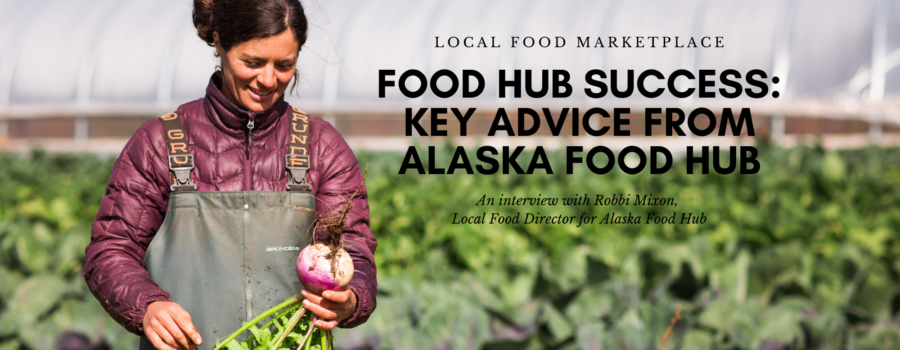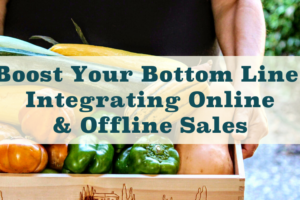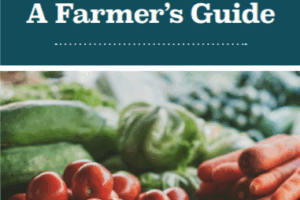Photograph provided by Alaska Food Hub
Since 2009, Local Food Marketplace has supported hundreds of food hubs by providing a streamlined sales and distribution platform backed by our expert Support staff.
We’ve put together an informative blog series focusing on stories of successful food hubs we’ve worked with for years. As new food hubs continue to emerge, we hope this series serves as a valuable resource to those starting out.
Part 1: The Alaska Food Hub
Starting a food hub is a huge undertaking but doing it from scratch in Alaska has its own unique set of challenges. Despite all the challenges, the Alaska Food Hub emerged in 2016 as the first food hub in Alaska to provide local communities with essential access to fresh, local food and a source of education for emerging food hubs.
Robbi Mixon, Local Food Director for Alaska Food Hub, says the biggest challenge was not having anyone in their area to learn from about starting and running a food hub. However, once the food hub met with Amy McCann, LFM CEO and Co-Founder, they found a source of guidance.
After connecting with LFM and folks at the National Good Food Conference, the Alaska Food Hub was inspired to start digging in and researching what other food hubs were doing. Per the recommendation of Amy, Robbi began talking to any and all food hubs they could.
“[The LFM Team’s] hand holding was super important. It’s why we’ve been so transparent and willing to help others, as it’s something we didn’t have,” says Robbi Mixon.
Now a go-to resource in Alaska, the Alaska Food Hub has come full circle both providing food and guidance to others supporting local food systems and food hubs.
We recently interviewed the Alaska Food Hub and Robbi Mixon to find out what it takes to start and run a successful food hub.
Major Successes & Wins
There were two major success stories of the Alaska Food Hub. According to Robbi, implementing a project that involved sending food across the bay to fly/boat-in only communities where there is low food access and income barriers to local food was a major success.
When COVID-19 lockdowns began, during a time when many businesses were struggling, the Alaska Food Hub experienced a massive boost. Robbi states that the Alaska Food Hub sold 4x more than what they normally did in the previous 4 years! Using the LFM platform to streamline their sales and distribution processes, the Alaska Food Hub was able to scale their operations to handle their quadrupling in sales and locations they serve.
Learning from Failure
Despite their successful operation, like all businesses they have experienced their fair share of failures. As part of their mission to help other food hubs, Robbi shared an important lesson they learned from a recent failure.
According to Robbi, “Attempting to break into a new and bigger market without the infrastructure to support it,” was a hard lesson learned. A combination of “lack of staffing and money to advertise made attempting to do sales in an area that had a lot of other opportunities for local food was tough.”
At LFM, we have over a decade’s worth of experience working with new, emerging, and expanding food hubs. Being able to manage good growth is integral to a successful business. (Check out our blog post “Getting a Handle on Sudden Growth” to read expert advice on managing business growth!)
Additionally, to help support customers like the Alaska Food Hub, we’ve recently released a new Mailchimp Integration! This integration syncs your customer contact information and email activity with your Mailchimp account, allowing for easy customer management and marketing campaigns.
Key Advice for New Food Hubs
According to Robbi and the Alaska Food Hub, here are three key pieces of advice for new food hubs and how LFM can help you:
-
- Give it a few years before you judge yourselves.
-
-
- LFM provides a wide-range of robust reports to help you analyze your business thoroughly over time. From revenue reports to customer information exports to granular order item reports, we make your data easy for you to analyze and download.
-
-
- Relationship building is important and looking at other food hubs in the area as partners as opposed to competition has been key.
-
-
- LFM offers discussion forums, regular educational webinars, and other opportunities to connect with other LFM users to all our customers.
-
-
- Own your mistakes and be transparent.
-
-
- When running a business, mistakes are bound to happen especially when you’re working with fresh food. Whether product fulfillment falls short, staff and producers get sick, or items break in delivery, LFM offers integrated order and distribution features so you can easily manage order items and emails in bulk! Never leave your customer wondering what happened or where their items went with key features like order notes, customizable invoices, automated updated order confirmations, and bulk credits.
-
Why Alaska Food Hub Chose Local Food Marketplace
When the Alaska Food Hub started looking for an online sales and distribution platform, they needed key features for the software. After Robbi met with Amy, these were the main reasons the Alaska Food Hub chose LFM:
Due to the everchanging needs and goals of their food hub, Robbi needed a platform that provided an expandable model with contractible options, without the hassle and a lot of extra costs. LFM was an ideal choice for Alaska Food Hub, offering flexible packages customizable to meet the diverse needs of food hubs, farmers, markets, and CSAs. The combination of LFM features and the ability to tap into the LFM team’s extensive knowledge, relationships and experience made the choice easy for the Alaska Food Hub.
More specific features the Alaska Food Hub needed that LFM provides in a software platform are:
-
- The ability to add multiple distribution and aggregation locations to suit multiple distribution days and ordering windows.
- The ability to adjust and automate ordering windows, aggregation days, and distribution information for customers and producers.
- According to Robbi, the Alaska Food Hub needed “a lot of hand holding at set up.”
Something unique to the LFM platform that Robbi loves is the robust training materials for both site managers, admins, and producers. LFM provides a clear onboarding experience with training sessions, manuals, check lists, an assigned account point-person, and one-on-one sessions available to get you started. Furthermore, support does not stop after onboarding: LFM provides continuous support through phone, e-mail, and web meetings available to all LFM customers. Unlike many platforms that charge extra fees or remove Support options after onboarding, the LFM Support Staff is known for their knowledge and assistance at no extra cost.
Additional Recommendations
Customer feedback and producer participation are necessary for starting and growing a successful food hub. Robbi suggests sending surveys to your customers and producers to get specific feedback. Sites like SurveyMonkey and Mailchimp provide free to low-cost marketing services for creating, sending, and collecting surveys. Now with LFM’s Mailchimp Integration, you can easily sync your LFM customer data with your Mailchimp account to send campaigns and surveys to your customers.
The last piece of advice Robbi offers to new food hubs is holding post season meetings with producers and customers to give them a voice and help make changes to what isn’t working. Listening to your producers and customers can give you corrections and ideas you may have never considered before. The LFM platform is constantly updating features and adding new functionality based on LFM customer conversations.
We hope you found this interview with Robbi Mixon, Local Food Director for Alaska Food Hub, to be a valuable resource for starting and managing a food hub. Stay tuned to our blog for the next installment in our series focusing on stories of successful food hubs!




